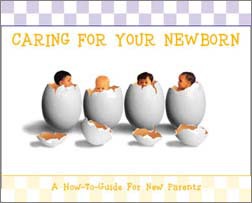 Keep your pediatrician’s phone number along with other emergency phone numbers near the telephone. Write down important names and phone numbers and keep them near the phone. When you call, be ready to give your baby’s age, weight, temperature, and how the temperature was taken. Have a list of all medicines your newborn is taking. Also, have the telephone number for your pharmacy handy. If you do not use a pharmacy regularly, look in the telephone book to find one near where you live. If you call without a pharmacy phone number, you may have to call back after you look up the number.
Keep your pediatrician’s phone number along with other emergency phone numbers near the telephone. Write down important names and phone numbers and keep them near the phone. When you call, be ready to give your baby’s age, weight, temperature, and how the temperature was taken. Have a list of all medicines your newborn is taking. Also, have the telephone number for your pharmacy handy. If you do not use a pharmacy regularly, look in the telephone book to find one near where you live. If you call without a pharmacy phone number, you may have to call back after you look up the number.
Call your pediatrician right away:
• if your baby’s temperature is above 100°F or lower than 97.1°F
• if your baby’s breathing sounds as if he is grunting, especially if his lips turn a purplish-blue color (a sign of breathing, lung or heart problem)
• if your baby has trouble breathing or stops breathing for more than 15 seconds
• if your baby has a purplish-blue color to his lips, face, or body (a sign that your baby is not getting enough oxygen)
• if his umbilical cord stump area or circumcision site smells bad (sign of infection)
• if your newborn has projectile vomiting more than once a day (could be allergic to formula)
• if your newborn does not wet his diaper for more than 12 hours (sign of dehydration)
• if your baby’s stomach is swollen and tender and he has trouble passing stool (could mean an intestinal blockage)
Call your pediatrician during regular office hours or as soon as his office opens the next morning:
• if your baby has chest congestion
• if your baby has a yellow or green discharge from his nose or eyes
• if your baby has a yellow skin color that turns a deeper yellow, or his normal skin color begins turning yellow after he is 5 days old (a sign of jaundice)
• if you see blisters, sores, or unusual rashes on his skin (sign of infection)
• if your baby refuses 2 feedings in a row or is not interested in feeding (your baby could become dehydrated)
• if your baby vomits several times in one day
• if your baby has diarrhea in more than 2 diapers in a row (your baby could become dehydrated)
• if your baby’s stools (poop) are pale or almost white
If your newborn’s symptoms tell you it’s an emergency, call 911.
• if your baby is so weak he hardly responds to you (a sign that your baby’s body temperature is too low or is very sick)
• if your baby is working very hard to breathe or finds it hard to take a breath
• if your baby grunts when he breathes (a sign of breathing problems)
• if your baby stops breathing for more than 10 seconds
• if your baby has a blue or dark purple color to his nails, lips, or gums (sign of heart or lung problem)

Caring For Your Newborn
Table of Contents
Introduction
Congratulations!
Caring Begins at Birth
Your Newborn’s Hospital Check-up
Ten Fingers and Ten Toes
Special Care for Your Newborn
When Your Newborn Cries
Changing Your Newborn’s Diaper
Feeding Your Newborn – breast or bottle feeding
Feeding Your Newborn – spit ups, weight gain, BMs
Bathing Your Newborn
Dressing Your Newborn
Shhh!! We’re Sleeping
Keeping Your Baby Safe
Your Newborn’s Admirers
Taking Your Newborn Out
If Your Newborn Gets a Cold
If You Have Questions
Well-baby Check-ups
When to Call Your Pediatrician
Take Care of Yourself, Too

